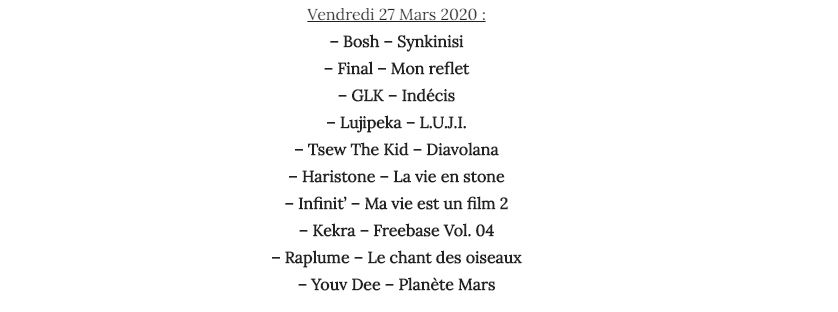Right now, it's a safe bet that you listen to your music via a streaming platform. Indeed, Deezer and its friends make our lives easier by offering varied and quickly accessible music content on our devices. All this at the expense of physical disks. If streaming can be seen as a relevant and useful innovation, it has also, over time, conditioned the listener: rapid consumption of albums, obsolescence of the album format… In short, let's focus on how streaming has changed the way we consume music.
A struggling music industry
Let's start at the beginning. In the 2000s, in France, the record industry was strongly affected. It is experiencing a long, unprecedented crisis. According to SNEP (Syndicat National des Écoutes Phonographiques), record sales fell by 19% in 2007. This is the biggest drop in Europe. The reasons are diverse: strong competition, whether from American artists or new French-speaking artists, the development of new media: Internet, telephone in mind… And of course the download. Let's take rap as an example. Indeed rap is a music listened to mainly by 15-34 year olds, who do not necessarily have the means to buy a record at FNAC or others. The second option is downloading, which is often illegal.  As a result, the music is consumed en masse by listeners but cannot be counted as a sale for the artist. Only the purchase of a disc serves as a sale. We find ourselves with this scenario: Artists find themselves undervalued because all the listens are not counted, while the number of rap listeners continues to increase. Indeed, when you are used to having records for free and quickly, you do not necessarily want to put your money back into a record.
As a result, the music is consumed en masse by listeners but cannot be counted as a sale for the artist. Only the purchase of a disc serves as a sale. We find ourselves with this scenario: Artists find themselves undervalued because all the listens are not counted, while the number of rap listeners continues to increase. Indeed, when you are used to having records for free and quickly, you do not necessarily want to put your money back into a record.
Solutions to the crisis
Faced with this spectacular fall of the record industry, the majors are trying to fight back. The solution can be summed up in one word: Streaming. Indeed, thanks to the emergence of streaming platforms such as Deezer or Spotify, the record industry is revived. These platforms are a real alternative to the record that has become obsolete. And the producers have understood that. These new tools are therefore used to distribute music. In 2019, there are no less than 248 million users worldwide on Spotify. In addition, according to SNEP, more than 50% of music transactions were made on the web. Clearly, streaming is a real second wind for music. 
Streams and sales
As we said above, record companies feel the wind turning. In addition, streaming really highlights the impact and the number of real listeners. In 2016, listening on streaming platforms is officially taken into account for an album. This is a major turning point because we are moving from a logic of purchase to a logic of listening. A system that is based on the number of times the music is played. This new method has also allowed rap to become the most listened to music in France very quickly. Indeed, rap is primarily aimed at young people and they are in the majority on music apps (34% of users are 16-34 years old). Thus, the consumption of a 17-year-old is not the same as that of a 45-year-old adult. While it has considerable benefits, streaming is changing the way music is produced, listened to, and enjoyed.
Overdose of music
At the time of the CD, the release of an album was an event. The headliner had prepared his project for 2 or 3 years and distributed a CD worked and completed to his audience. The listener enjoyed the artist's CD for a long time because he knew full well that the next one would be released in a long time. There was a sentimental limit with the CD, because it represented a culmination. In the era of streaming and dematerialized music, the listener finds himself with a record overproductivity. It even happens that an artist releases 2 projects in the same year. Like Jul for example. This overproductivity inevitably leads to overconsumption of the product.  Indeed, we come to consume music like fast food, to the point that we barely have time to digest that we are forced to eat the rest. In addition, add to this the number of artists that has tripled, due to the ease of production. This musical abundance is noticeable on Friday, the day of album releases, where almost every week, the public finds itself with 5 projects to listen to at least. So yes, nothing forces you to listen to all the projects, but it is clear that we are faced with a supply much higher than demand.
Indeed, we come to consume music like fast food, to the point that we barely have time to digest that we are forced to eat the rest. In addition, add to this the number of artists that has tripled, due to the ease of production. This musical abundance is noticeable on Friday, the day of album releases, where almost every week, the public finds itself with 5 projects to listen to at least. So yes, nothing forces you to listen to all the projects, but it is clear that we are faced with a supply much higher than demand.
Commercial music
Then there is the problem of production. The musicians understood the importance of "Replay value" with the stream. So you need catchy sounds, easy to listen to. As a result, the music, and by extension the albums, are much shorter than at the time in terms of duration. The defunct XXXtentacion had released an album of 18 tracks for a total duration of 37 minutes… The consumption of an album is different, the number of albums that are released on the same day means that we can not dwell on all the projects. Fans will select titles, either featurings or hits and put them in their playlist and the rest: trash! Artists, when creating their albums, will therefore take into account these criteria and adapt their music to tour in playlists or radio.  It is therefore with a marketing than artistic conception that they prepare their projects. It seems that there are specifications that 90% of music players impose themselves. To illustrate the point, here is an example: When the "afrotrap" phenomenon appeared in France, carried by MHD, many artists surfed on the afro wave while it did not correspond to their basic music. We can cite Kaaris for example with the title Tchoin. A rather danceable title at the antipodes of what he could do on Or Noir.
It is therefore with a marketing than artistic conception that they prepare their projects. It seems that there are specifications that 90% of music players impose themselves. To illustrate the point, here is an example: When the "afrotrap" phenomenon appeared in France, carried by MHD, many artists surfed on the afro wave while it did not correspond to their basic music. We can cite Kaaris for example with the title Tchoin. A rather danceable title at the antipodes of what he could do on Or Noir.
The album format in jeopardy
Taking up the argument above, we can wonder if the album format is still relevant with streaming. The playlist phenomenon makes the album format obsolete. Indeed, today, few listeners listen to albums from beginning to end. Add to that the length of the album. To increase their number of streams, artists do not hesitate to offer albums that can exceed 40 tracks like Chris Brown and his album Indigo . Isn't it more relevant for some artists to release sounds at regular intervals or short EP-style projects? Rather than stubbornly producing average albums in which the listener will retain only 2 to 3 sounds? Good question! Ultimately, streaming revolutionized the record industry and allowed it a renaissance. It demonstrated in figures, the real listening of some artists and allowed rap to settle as the new variety in France. It must be recognized that streaming platforms have a real cultural impact by providing vintage and modern music content. However, thanks to (or because of) him, music will never be consumed as before. The affect and cult of CDs is replaced by overconsumption and obsolescence.

































![[Live Report] Rock En Seine 2024 : 20 ans et toujours aussi passionnés !](https://www.justfocus.fr/wp-content/uploads/2024/11/RES24_JOUR01_LANA-DEL-REY_LOUIS-COMAR-12.jpg)





